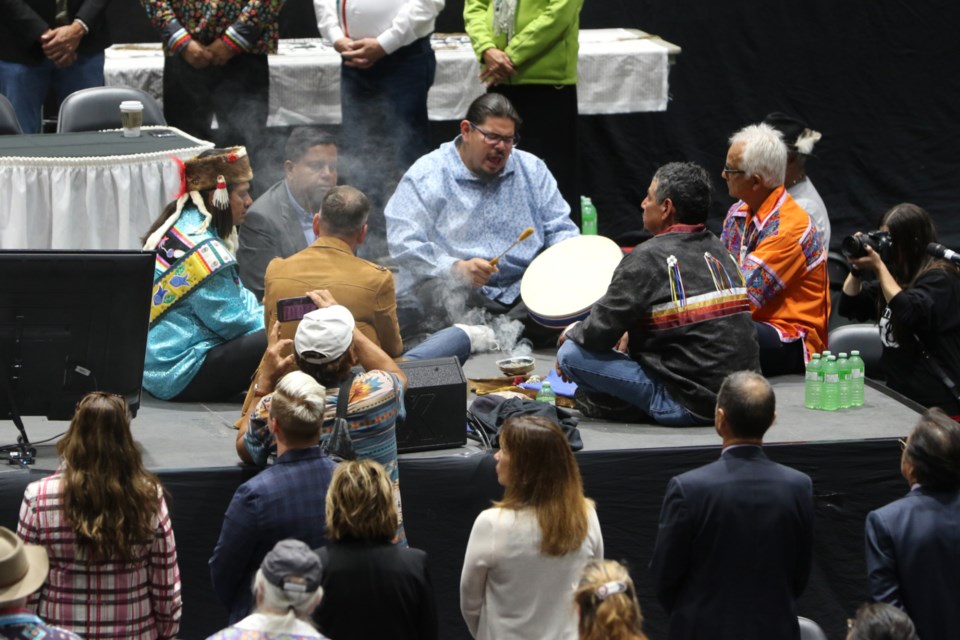Partial judgement ordering funds to be transferred to 21 First Nations included in 1850 Robinson Huron Treaty handed down in Ontario Superior Court this week

NationTalk: SooToday.com – The $10-billion settlement awarded to Robinson Huron Treaty annuitants for past compensation is slated to be distributed to 21 First Nations included in the treaty in the coming weeks.
A partial judgment by Ontario Superior Court Justice Geoffrey B. Morawetz was granted Feb. 26. That means both Canada and Ontario have a period of 60 days from the issuance of the court judgment to pay out $5-billion each in accordance with the settlement agreement.
“There are many issues that have still to be dealt with, including the go-forward implementation. However, I urge you to take the time to reflect on this achievement because it is significant,” the Robinson Huron Litigation Fund said in an email Wednesday. “It is the largest First Nations’ settlement in the history of the country. It resolves an aspect of a grievance that has been outstanding for 150 years and it sets the stage for renewal of the relationship going forward.”
The settlement provides past compensation to Robinson Huron Treaty beneficiaries after not seeing an increase to annual treaty payments for a period of nearly 150 years, as wealth generated in the territory through resource revenues from the mining, forestry and fishing sectors continued to grow.
The annual treaty payments to Anishinaabe beneficiaries, also known as annuities, have remained at $4 per person since 1875. Prior to that, the annuities were $1.60 per person.
In 2018, the Superior Court of Justice ruled the Crown had an obligation under the 1850 treaty to increase annuities as wealth generated from the land grew over time, so long as the Crown can do so without incurring a loss.
Ontario has since taken its appeal of both the Stage 1 and Stage 2 decisions in the annuities claim to the Supreme Court of Canada, after the Ontario Court of Appeal previously upheld the decisions in 2021.
During court hearings for the Supreme Court appeal this past November, Ontario argued that the treaty should be interpreted to mean that the province should determine increases to the annuity, and not the courts.
The province has also argued that awarding past compensation for historical treaty breaches is inappropriate, and the Robinson Huron Treaty Litigation Fund — the legal team representing treaty interests in the annuities claim — should only be entitled to receive declarations from the court at a future hearing for Stage 3 of the annuities claim court case.
The litigation fund has countered that Ontario has a legal obligation to increase annuity payments over time. It’s anticipated the Supreme Court will hand down a decision on the province’s appeal sometime this year.
Meanwhile, a number of First Nations are still in the process of consulting with band members through community engagement sessions in order to determine how the funds will be distributed on a local level.
The First Nations included in the Robinson Huron Treaty are Atikameksheng Anishnawbek, Aundeck Omni Kaning, Batchewana First Nation, Dokis First Nation, Henvey Inlet First Nation, M’Chigeeg First Nation, Magnetawan First Nation, Mississauga First Nation, Nipissing First Nation, Garden River First Nation, Sagamok Anishnawbek, Serpent River First Nation, Shawanaga First Nation, Sheguiandah First Nation, Sheshegwaning First Nation, Thessalon First Nation, Wahnapitae First Nation, Wasauking First Nation, Whitefish River First Nation, Wiikwemkoong Unceded Territory and Zhiibaahaasing First Nation.
The Robinson Huron Treaty was signed on September 9, 1850 in present-day Sault Ste. Marie.
About the Author: James Hopkin
James Hopkin is a reporter for SooToday in Sault Ste. Marie